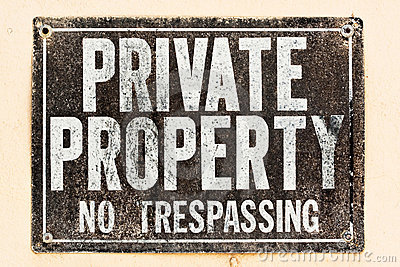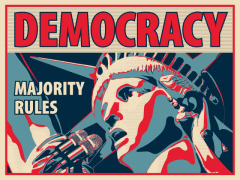Most people don’t bother to think about where the conception of private property comes from. They simply assume we have a right to the fruit of our labor and our efforts . But should we?
The notion that property was a natural right was one that developed in the seventeenth century and was developed most articulately by John Locke in his Second Treatise of Government. There Locke argued that property was a “natural” right, meaning it was implicit in nature and in God’s creation of the world. In arguing that property was a “natural” right, Locke was disagreeing with other key figures in the natural right tradition such as Pufendorf, Grotius and Hobbes that property was a human convention, born out of an agreement or contract between human beings.
This was a radically different view of property than that put forward by Locke and which came to dominate our thinking in the West. The natural rights tradition, starting with Grotius, Hobbes and Pufendorf, had in fact argued that the natural world had been given in common to all human beings. All nature was “in common.” All humans had the same rights with respect to nature. Noone had any private property in the beginning. This is a startling and oft forgotten picture of some of the key natural rights philosophers had of early human history. For all of these thinkers, private property as a conception was created by human convention. It was not a fact of nature. What was a natural right was the right to take from what was common in order to preserve one’s life.
Locke didn’t like this view of property and wanted to push property as a right back into nature. Unlike Hobbes and Grotius, Locke thought the very notion of natural rights depended on a conception of God and that the laws of nature were already present in nature. He wanted property to be a natural right as well and took issue with those who saw private property as a human convention. Locke agreed however that all of nature was given to human beings “in common” at the beginning. This was consistent with his view, and that of Hobbes, that all human beings were “equal.” But, Locke, asked, “if everything is given in common, then how can anyone use it for their personal use and take it out of the common?” God must have provided a means that what was in common could be used for personal use. And Reason tells us that labor is that means. Locke’s answer then was that human labor made what was “in common” into what was private property. By laboring humans mixed what was their own (“their labor”) in with what was in common. Thus “labor” was the natural means by which what was given in common could be made private. And in this way private property though not existing at the beginning was still part of nature.
It is good to think about how the notion of private property as a natural right is an invention of seventeenth century political philosophers. And it is good in this day and age to remember the view of these same founding philosophers that the world was given originally to humanity in common. Where did that insight go?
I am current writing more about this notion of property as a natural right. If you want to see more about what I’m thinking in general about natural rights, see my website www.freedomandcapitalism.com.
Great Quote of the day:
Though the earth, and all inferior creatures, be common to all men, yet every man has a property in his own person: this no body has any right to but himself: The labour of his body, and the work of his hands, we may say, are property his. Whatsoever then he removes out of the state that nature hath provided, and left it in, he hath mixed his labour with, and joined to it something that is his own, and thereby makes it his property. It being by him removed from the common state nature hath palced it in, it hath by this labour something annexed to it, that excludes the common right of other men: for this labour being the unquestionable property of the labourer, no man but he can have a right to what that is once joined to, at least where there is enough, and as good left in common for others. (Locke, Second Treatise, II §27)
For further reading:
John Locke, The Second Treatise of Government, II § 25-51
Compare Locke, for example, with the differing views of
- Samuel Pufendorf, Of the Law of Nature and Nations, Book IV, Chap. III
- Thomas Hobbes, Leviathan, Chap. 15
- Hugo Grotius, The Rights of War and Peace, Book I, Chap II. 2.




